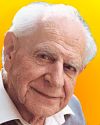 (source)
(source)
|
Karl Raimund Popper
(28 Jul 1902 - 17 Sep 1994)
Austrian-British philosopher of science remembered for his writings on theory of scientific method.
|
Karl Raimund Popper Quotes on Test (5 quotes)
>> Click for 42 Science Quotes by Karl Raimund Popper
>> Click for Karl Raimund Popper Quotes on | Criticism | Falsification | Idea | Knowledge | Refutation | Science | Scientific Method | Theory | Truth |
>> Click for 42 Science Quotes by Karl Raimund Popper
>> Click for Karl Raimund Popper Quotes on | Criticism | Falsification | Idea | Knowledge | Refutation | Science | Scientific Method | Theory | Truth |
But I shall certainly admit a system as empirical or scientific only if it is capable of being tested by experience. These considerations suggest that not the verifiability but the falsifiability of a system is to be taken as a criterion of demarcation. In other words: I shall not require of a scientific system that it shall be capable of being singled out, once and for all, in a positive sense; but I shall require that its logical form shall be such that it can be singled out, by means of empirical tests, in a negative sense: it must be possible for an empirical scientific system to be refuted by experience. (1959)
— Karl Raimund Popper
The Logic of Scientific Discovery: Logik Der Forschung (1959, 2002), 18.
I think that we shall have to get accustomed to the idea that we must not look upon science as a 'body of knowledge,' but rather as a system of hypotheses; that is to say, as a system of guesses or anticipations which in principle cannot be justified, but with which we work as long as they stand up to tests, and of which we are never justified in saying that we know they are 'true' or 'more or less certain' or even 'probable.'
— Karl Raimund Popper
The Logic of Scientific Discovery (1959), 317.
It is easy to obtain confirmations, or verifications, for nearly every theory—if we look for confirmations. Confirmations should count only if they are the result of risky predictions... A theory which is not refutable by any conceivable event is non-scientific. Irrefutability is not a virtue of a theory (as people often think) but a vice. Every genuine test of a theory is an attempt to falsify it, or refute it.
— Karl Raimund Popper
Conjectures and Refutations: The Growth of Scientific Knowledge (1963), 36.
The method of science depends on our attempts to describe the world with simple theories: theories that are complex may become untestable, even if they happen to be true. Science may be described as the art of systematic over-simplification—the art of discerning what we may with advantage omit.
— Karl Raimund Popper
Karl Raimund Popper and William Warren Bartley (ed.), The Open Universe: an Argument for Indeterminism (1991), 44.
by Karl Raimund Popper, William Warren Bartley - Science - 1991
There can be no ultimate statements science: there can be no statements in science which can not be tested, and therefore none which cannot in principle be refuted, by falsifying some of the conclusions which can be deduced from them.
— Karl Raimund Popper
The Logic of Scientific Discovery (1959), 47.
See also:
- 28 Jul - short biography, births, deaths and events on date of Popper's birth.
 In science it often happens that scientists say, 'You know that's a really good argument; my position is mistaken,' and then they would actually change their minds and you never hear that old view from them again. They really do it. It doesn't happen as often as it should, because scientists are human and change is sometimes painful. But it happens every day. I cannot recall the last time something like that happened in politics or religion.
(1987) --
In science it often happens that scientists say, 'You know that's a really good argument; my position is mistaken,' and then they would actually change their minds and you never hear that old view from them again. They really do it. It doesn't happen as often as it should, because scientists are human and change is sometimes painful. But it happens every day. I cannot recall the last time something like that happened in politics or religion.
(1987) -- 


